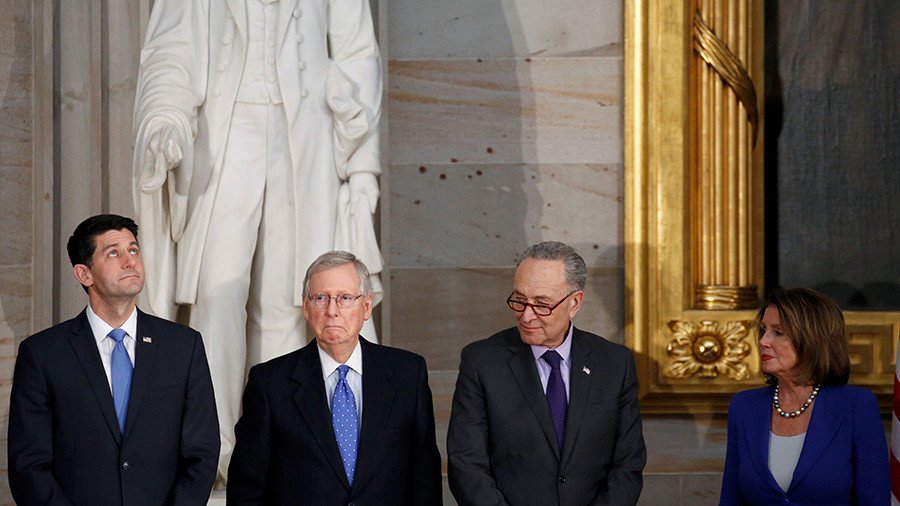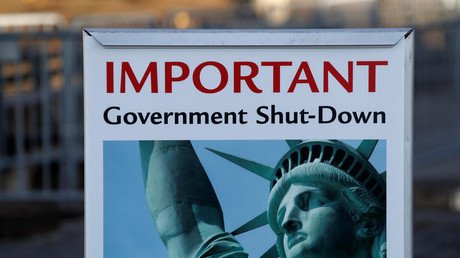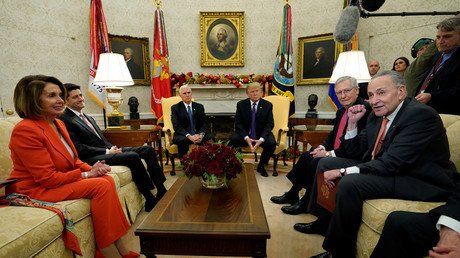Shutdown done, Washington politicians back to being ‘frenemies’

The open feud between Democrats and Republicans lasted for about three days, at which point both parties reverted to seeing eye to eye on many issues, from perpetual war and surveillance to an aggressive foreign policy.
The US government closed down for three days due to a seemingly intractable dispute between Democrats and Republicans. At its heart was the status of immigrants brought into the US illegally as children, described by the Democratic leadership as “the great civil rights issue of our time.” President Donald Trump described it as a “nice present” from the Democrats on his first anniversary in office.
Technically known as a “lapse in appropriations,” the shutdown affected non-essential government employees and contractors. Military operations continued more or less unimpeded, while most workers at the departments of Labor, Agriculture, Health, Housing and Education, for example, were told to stay home Monday. NASA delayed some operations, as did the Smithsonian Institutions museums and some national parks.
Yet the brinkmanship that kept nearly a million federal employees worried about their paychecks, overshadowed the number of issues on which Republicans and Democrats actually agree.
The war will go on
“It’s disappointing to every American that Democrats would shut down the government at a time when we have troops in harm’s way,” Vice President Mike Pence said on Saturday, during a refueling stop in Ireland. The obvious problem with that, is that with bases and deployments in 150 countries around the world, US troops are always in harm’s way somewhere.
“We will continue to execute daily operations around the world – ships and submarines will remain at sea, our aircraft will continue to fly and our warfighters will continue to pursue terrorists throughout the Middle East, Africa and South Asia,” Defense Secretary James Mattis wrote in a memo to the troops.
The most recent data from the Pentagon indicates that it costs $250 million a day to pursue the war on terrorism since it began in 2001. Neither party is in favor of cutting military spending.
I spy, with my little eye...
Even as Republicans and Democrats spar over investigations that have so far generated zero evidence of “Russian collusion,” they back unrestricted US spying on the world. The bill reauthorizing Section 702 of the Foreign Intelligence Surveillance Act (FISA) sailed through both chambers of Congress earlier this month. The House passed the reauthorization 256-164 on January 11, while the Senate voted 65-34 in favor a week later.
This is the bill that passed the House when the GOP majority joined with Nancy Pelosi and Adam Schiff, and passed the Senate when the GOP majority joined with Dianne Feinstein Mark Warner and friends. Congrats to all on this bipartisan increase of spying power for the Trump Admin https://t.co/31zkm8WQs3
— Glenn Greenwald (@ggreenwald) January 19, 2018
Some critics have pointed out that the very same Democrats who argued that Trump was an agent of a foreign power and had dictatorial tendencies, then turned around and agreed to give his administration unprecedented and extensive spying powers.
Mere days after voting to extend Section 702, a number of Republicans complained about how the Obama administration abused surveillance powers, according to a memo composed by the GOP majority on the House Intelligence Committee, which remains classified.
I dreamed a dream
Even on the subject that actually precipitated the shutdown ‒ the fate of “Dreamers,” people brought into the US illegally as children and granted temporary protections by President Barack Obama’s an executive orders ‒ the two parties have more in common than they’d like to admit.
In September 2017, the Department of Justice announced it would phase out the Deferred Action for Childhood Arrivals (DACA) program by March 2018, and Trump urged Congress to replace this executive action with a proper law. He has given Congress a list of White House principles on immigration, which in effect agree with giving some kind of amnesty to DACA recipients in exchange for the border wall, tougher enforcement, and an end to the diversity lottery and chain-migration practices.
The negotiations took a nasty turn after Senator Dick Durbin (D-Illinois) claimed Trump had referred to some countries as “sh*tholes,” a claim several Republicans present in the meeting have contested. Within a week, the Democrats were invoking DACA as the reason to block the continuing resolution.
Lost in the opprobrium was one very important detail: No DACA recipients were about to be deported any time soon. On January 9, a federal district judge issued a preliminary injunction ordering the government to “maintain the DACA program on a nationwide basis.” The Department of Justice has since petitioned the Supreme Court to expedite the hearing of the case, but did not request a stay of the injunction. This means DACA remains in effect until the Supreme Court rules on it, one way or another.
Regime change and nation-building
Despite campaigning on the promise of no more “nation-building” and pointless foreign wars, Trump has reversed course after several months in office. In August 2017, he announced he would send more troops to Afghanistan and “fight to win.” Trump’s State Department has likewise adopted a policy towards Syria that’s virtually indistinguishable from his predecessor’s.
“A stable, unified and independent Syria ultimately requires post-Assad leadership in order to be successful,” Secretary of State Rex Tillerson said last week, speaking at Stanford University's Hoover Institution. Such a statement could have come straight out of the mouth of John Kerry ‒ or Hillary Clinton, for that matter.
He explained that US troops will stay in Syria indefinitely, until any and all vestiges of Islamic State (IS, formerly ISIS/ISIL) have been defeated and someone other than Bashar Assad rules in Damascus. American troop presence in Syria is directly violating international law, and even domestic US law, since it’s at best stretching the 2001 congressional authorization to fight Al-Qaeda terrorists.
And sanctions for all
For all their supposed partisanship, Republicans were all too eager to follow the lead of minority Democrats last July, when both chambers of Congress voted overwhelmingly in favor of the ‘Countering American Adversaries Through Sanctions Act’ (CAATSA), put together by foreign policy hawk Ben Cardin (D-Maryland). Only five lawmakers ‒ three in the House and two in the Senate ‒ voted against the bill, giving President Trump no choice but to sign it.
“By limiting the Executive’s flexibility this bill makes it harder for the United States to strike good deals for the American people, and will drive China, Russia, North Korea much closer together,” Trump said as he signed the bill in August.
The longest government shutdown was in 1996, during the administration of Bill Clinton, and lasted 21 days.The most recent interruption of executive branch operations was in October 2013, during the presidency of Barack Obama, when a standoff over Obamacare between the Republican-led House and the Democrat-controlled Senate lasted 16 days.
















